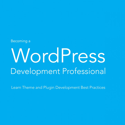On this blog, I spend a significant amount of time talking about WordPress plugin development. It’s not that I dislike theme development, obviously, but I just don’t spend as much time working on them as I do plugins.
Regardless, I often receive questions that are generally “where do I learn WordPress development?” And that’s always a hard question to answer because we all have different learning styles.
To oversimplify it and distill it down into two methods, I’d say that:
- Some learn best by doing
- Some learn best by reading
Personally, I learn best by doing. This isn’t to say that I don’t actually read books, articles, sites, etc., but I have to put into practice what I’ve read, bang my head against the keyboard in order to decipher error messages (a common strategy, of course), and then move on to the next topic.
Not everyone is like that.
But still, the question remains: where can someone learn WordPress Development?
Continue reading





